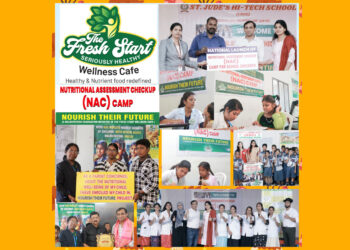In the bustling landscape of India’s restaurant industry, one name stands out for its relentless pursuit of culinary excellence and innovation: Rohit Tandon. From humble beginnings with Yummy Tummy to co-founding Fraterniti Foods and launching successful ventures like China Box and Zoca, Rohit Tandon has reshaped the dining experience, catering to evolving consumer tastes while fostering a vibrant culinary culture. In an exclusive interview, Mr. Tandon shares insights into their entrepreneurial journey, challenges faced, and strategies employed to scale their businesses and revolutionize the Indian dining scene.
1. What inspired you to venture into the restaurant industry, and how did you identify the opportunity for China Box and Zoca?
1. My journey into the restaurant industry was motivated by a combination of passion for hospitality and a keen entrepreneurial spirit. Having worked in various roles within the hotel industry, I saw an opportunity to create unique dining experiences that catered to evolving consumer preferences. China Box and Zoca were born out of our observation of emerging trends and gaps in the market. With China Box, we tapped into the growing demand for Chinese cuisine in a convenient takeaway format. Zoca, on the other hand, was conceived as a response to the need for diverse culinary offerings in a vibrant café setting. Identifying these opportunities required careful market research and a deep understanding of consumer behavior.
2. Could you share some insights into the journey from starting Yummy Tummy to co-founding Fraterniti Foods and the subsequent success with China Box and Zoca?
2. The journey from Yummy Tummy to Fraterniti Foods has been a remarkable one, characterized by perseverance, innovation, and strategic decision-making. Yummy Tummy laid the foundation by capitalizing on the corporate catering trend, providing quality meals to businesses. Co-founding Fraterniti Foods with Karan Makan allowed us to scale our operations and diversify our offerings. China Box emerged as a successful venture by capitalizing on the popularity of Chinese cuisine, while Zoca further expanded our portfolio by offering a wide range of cuisines in a unique café atmosphere. Each step in this journey involved identifying market gaps, adapting to changing consumer preferences, and leveraging our collective expertise in the hospitality industry.
3. What challenges did you face while scaling your businesses, and how did you overcome them?
3. Scaling our businesses presented numerous challenges, ranging from operational logistics to market competition. One of the primary challenges was maintaining quality and consistency across multiple locations while ensuring efficient supply chain management. We overcame these challenges by investing in robust training programs, implementing standardized processes, and leveraging technology for operational efficiency. Additionally, strategic partnerships and collaborations helped us navigate regulatory hurdles and expand our market presence. Continuous innovation and agility in responding to market dynamics were also crucial in overcoming challenges and sustaining growth.
4. Zoca stands out with its unique approach of offering live performances during weekends. What motivated this decision, and how has it impacted the customer experience?
4. The decision to incorporate live performances at Zoca was driven by our desire to create memorable experiences for our customers beyond just food. We wanted to differentiate ourselves in the crowded restaurant space and provide a platform for local artists to showcase their talents. This decision has had a significant impact on the customer experience, enhancing the ambiance and creating a vibrant atmosphere. Customers appreciate the opportunity to enjoy live music and stand-up comedy while dining, elevating their overall dining experience and fostering a sense of community.
5. Could you elaborate on your strategy of introducing cloud kitchen brands and how it has contributed to the growth of Fraterniti Foods and its franchisees?
5. Our strategy of introducing cloud kitchen brands was born out of the need to adapt to changing consumer preferences and capitalize on the growing demand for delivery and takeaway options. By offering a diverse range of culinary brands under one roof, we not only cater to different tastes but also maximize revenue potential for our franchisees. These cloud kitchen brands leverage our existing infrastructure and operational expertise, allowing franchisees to expand their business without significant overhead costs. This strategy has contributed to the overall growth of Fraterniti Foods by enhancing brand visibility, increasing market penetration, and driving customer loyalty.
6. With plans to launch new brands across India and expand into cities like Srinagar, how do you ensure maintaining quality and consistency across all locations?
6. Maintaining quality and consistency across all locations is paramount to our brand’s reputation and success. We achieve this through rigorous quality control measures, standardized operating procedures, and regular training programs for our staff. Each new brand launch undergoes extensive testing and refinement to ensure adherence to our quality standards. Additionally, we appoint dedicated quality assurance teams and implement stringent monitoring mechanisms to address any deviations promptly. As we expand into new cities like Srinagar, we prioritize local sourcing and cultural adaptation while upholding our commitment to excellence.




















